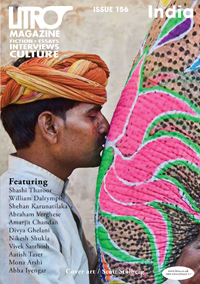You have no items in your cart. Want to get some nice things?
Go shopping 6am
6am
At 6 in the morning, with a weak winter sun just rising, I open the door to put my milk bottles out. Sharmini Subramaniam is already out on the street, hugging herself and wondering about aimlessly but I know what she is actually doing, is exercising. I don’t know Sharmini Subramaniam. In fact, I don’t even know her name. I call her Sharmini Subramaniam because that’s what I’ve named her. She looks like she could be one. She’s small and dark, and she wears an ill-fitting salwar-kameez which makes her already thin body look even more formless. Her face, I suppose, would be attractive at a Bharatanatyam dance contest; a red bindi on her large forehead, the kohl rimmed hard around her black fish-shaped eyes, a snub nose and a pointy chin. Her hair is slick with coconut oil which she parts with determined precision right at the centre and then braids into two thick plaits which fall on either side. I can tell she’s newly arrived from India. She has that smell which wraps itself around women and men and children newly arrived from India; of pickles and incense and sometimes of camphor balls as if their clothes have all been resting in a suitcase for a very long time. Every morning she walks to the end of the street and back again.
Last Wednesday, our paths crossed at the corner shop, which Ismail runs with the help of his ‘cousin-brother’. Ismail’s shop is so cluttered with things, there is hardly any space to walk and I wonder how he keeps an eye on it all; the sweeties and cigarettes and bottles of distilled vodka and refrigerated Pukka pies, and spreading onto the floor are the tin cans of beans and fruit in heavy syrup and sachets of pet food all gathering dust. Sometimes, he puts a cereal-box in front of a particularly offending pair of silicon breasts popping out from the cover of GQ magazine but mostly, he doesn’t care that it’s haram (sinful), in his religion, to stare at the candescent nakedness of a woman.
He’s always there at 6 in the morning, his skull cap a little off kilter, his beard droopy with long strands of grey, his summer coat which doubles as his winter coat stretched tightly over his large belly, pulling up the aluminium-grey shutters, nodding at pedestrians and ushering in the early morning commuters.
‘Why do you work so hard, Ismail?’ I ask him one morning.
‘Betti, in Pakistan you would call me baba, yeah? Here you can be disrespectful to me. Calling me Ismail. I am not your younger brother, yeah?’ Ismail pretends to be cross, but he’s glad for the conservation.
‘I work because it is the honourable thing to do. You want me to live on benefits, yeah?’
I saw Sharmini buy full-cream milk at Ismail’s. She had tucked under her arm a book with large lettering, ‘English as Your Second Language in Three Months’. She looked at me in that earnest way people who share your skin colour do; for some sign of recognition, some distant, primal force of solidarity. I looked away in embarrassment. I bought my newspaper and my organic yoghurt and hurried out of the shop. I walked home, faster than I had intended. When I reached my house on Park Lodge Avenue with its pyramid shaped roof, smudged bay windows and unkempt weed-ridden front garden, I looked back. She was dawdling behind me, alone, in her usual way, which infuriates me. London is a city of speed. How long before she learns to walk like the rest of us?
9am
Michael reaches over my shoulder and grabs the milk from the fridge. He sits at the table with a cup of coffee and opens the newspaper to centre page.
‘The pakis are at it again,’ he says, ‘another one from Bethnal Green calling for Sharia law in Britain.’
‘Things must be really bad in Bethnal Green,’ I say.
He stretches out his arms, loops them behind his neck and smiles at me sheepishly. I smile back, grateful I don’t have to bear the burden of Muslim collective guilt.
‘Got any croissants?’
‘Yes, in the bread bin.’
He looks older than his thirty-six years; the hair about his ears already grey, the stomach soft and sagging, the shoulders hunched. We met at a university mixer. He had about him, in those days, the air of a young, liberal revolutionary spouting obscure Russian writers and pasty poets.
‘What are you reading?’ he had asked, hulking over me like a Viking warrior, a little too pink in the face, wearing a fashionably crumpled linen shirt, smelling of leader-bound books and lamb gravy.
‘Middle English Literature.’
Back then, I still believed the world owed me something; that all a woman needed to succeed in life was an opinion and sexy underwear. Back then, I didn’t know a university degree in Middle English Literature, interrupted by marriage, would only buy me domesticity (labelled a life-style choice) and a few evenings a month at the local library book club.
Now neither of us are sure of our liberalism. We still sit in front of the television in the evening and watch Channel 4 compete with the BBC over its liberal bias, and every Sunday, Michael buys the weekend edition of The Observer, but more often than not, surrounded by stories of stranded refugees, we find ourselves shaking our heads in disagreement.
‘We can’t rescue them all,’ he says.
‘Maybe it’s us that needs rescuing,’ I say, avoiding his gaze.
In here, within these four walls, in this orderly kitchen empty of the clutter children bring to people’s lives, Michael and I are safe; insulated from the political correctness we endure with our friends. In here, sitting across this table with a croissant in hand, bound by our failures and the casualties of our dreams, banter and racism is permitted in the spirit of bonding.
11am
Sharmini and I share the wall of our living room. From the other side, I can hear her crying. Soft sobs. Loud sobs. Choked sobs. I imagine if I bump into her in the street, later in the day, I’ll find the kohl running down her face.
Sharmini has a husband. I know this because I see him leave the house every morning with a plastic bag in hand, preoccupied on his cell phone. I can smell the chapattis she cooks for him and hear the songs she sings when he is away. In such imperceptible ways, I am aware of my neighbour’s existence. Beyond that, I don’t want to know anything about Sharmini. I don’t want to know about her mother-in-law or the problems with her washing machine or if she is lonely or any of the things women talk about. Knowing them would burden me; they would consume my time and my attention. I would have to offer advice and comfort and hope. Sharmini would become real.
Sometimes, I see Sharmini talking, near the bus stop, to a gaggle of women, all newly arrived from India; their vowels rattling, their consonants harsh. Sharmini talks rapidly with her words, her eyes, her hands, her bobbing head all of which form part of her alien language. The rain, the icy cold wind, the soft falling snow, none of it perturbs them. For a brief while, they are transported by the weightlessness of language and laughter to a less foreign world. I grudge them this carefree insolence; oblivious to the stares of fellow commuters.
I’m weighed down by what Miss Richards, two houses down, is thinking. Miss Richards, who used to be the French teacher at the state primary school and who used to vote Liberal Democrat but now votes Conservative and is infuriated with our open borders, as she calls them.
‘It’s the future of our country at stake,’ she tells me, arms flailing about helplessly.
I nod and agree amicably.
I can never be defiant. I was taught to keep my head low, learn the language, blend in, become invisible.
12:30 pm
I watch from my kitchen window young boys on bicycles trawling the street for mischief. Travellers. I feel a certain dread in the pit of my stomach. My hijabi friend (I’ve told her not to wear the hijab, to avoid trouble. I feel uncomfortable when I’m with her) tells me to call them pikeys.
‘They hate that,’ she says.
‘What does it mean?’
‘I don’t know but they hate it.’
I look up the word pikey: a derogatory term; an ethnic slur; a person who moves from place to place. Not so long ago, Irish travellers had a camp in this area until developers forced them to move. Now, they roam around, a pale-faced tribe of unwashed hair and velour tracksuits; displaced from the only way of life they have known.
I finish washing the coffee mugs; the water swirls down the drain effortlessly, compelled by an inner compass towards some eventual destiny.
4pm
I walk to the nearby pharmacy. Last night’s soft flakes have gathered on the street in slushy piles of snow, deceptively charming, over a layer of black ice. The air feels crisp and pure and fragrant. In the distance, I can discern the tiny figure, almost a speck, of Sharmini set against the horizon. She disappears quickly into the thicket of shops: the launderette, the Sealife Kebab Land, the Hong Kong export emporium, the Polish sklep, the Krishnan Cash and Carry piling their sacks of onions, potatoes, brinjals, watermelons and papayas onto the pavement, the riot of cars parked illegally, the post office whose officious-looking postmaster also sells plastic buckets and frying pans, the dreary railway station beyond which is a small bridge with rusting Victorian lamp posts on either side of a sluggish canal, as if mourning a past, of which Britain is at once proud and ashamed. When did all this change take place?
I pay for my progesterone tablets and push the heavy glass door open. Not far from me is Sharmini returning with two plastic bags in hand. She walks past me, turns the corner and for a moment stands very still, looking out on the street bereft of houses, vacant of cars and pedestrians, suddenly remote and silent. In that instance, I realise why she has hesitated in crossing. She looks at me briefly. Then just as quickly, the swarm of traveller kids on bicycles surround her, enclosing her in an unassailable fortress of hate which grows thicker with every taunt. Their shadows lengthen on the solitary road; monkey sounds emerge from all directions spurred on by the courage of the pack.
Sharmini hisses back, crouched cat-like, small and diminished. Her lips tremble and a tiny bit of spittle escapes her mouth making its way down the chin. The boys make repeated attempts to snatch the dupatta covering her upper torso, but they miss. One of the younger boys pedals dangerously close and yanks it off, letting it drop a few feet away from her. Exposed and vulnerable, she stands erect, her back arched, her stomach protruding, her hand instinctively protective of the little bump of impending motherhood.
I stand rooted; impaled by cowardice. The sun slides into the sky taking with it the last rays of light, leaving us all in the sepulchral glow of a winter’s evening. The boys, now a spent force, cycle away, jeering as they race uphill, their little faces ruddier with an afternoon’s easy triumph. Sharmini, crosses the street, a wraith, a nimbus floating homewards.
***
Months later, both of us volunteer at the community centre.
‘My name is Kamla,’ she says, the salwar-kameez discarded like a shrivelled skin; in its place is a loose maternity dress pulled over her bulging breasts; she smiles across the Formica table-top which separates us.

About Selma Carvalho
Of Goan origin, Selma Carvalho grew up in Dubai, spent several years in the snow-bound prairie of Minnesota, USA, before moving to London in 2008. She is the author of the non-fiction book, A Railway Runs Through: Goans of British East Africa, 1865-1980. Between 2011-2014, she headed the Oral Histories of British-Goans project funded by the UK Heritage Lottery Fund. She is widely published in India as a columnist and features writer. She has only now returned to her first love, fiction-writing.




